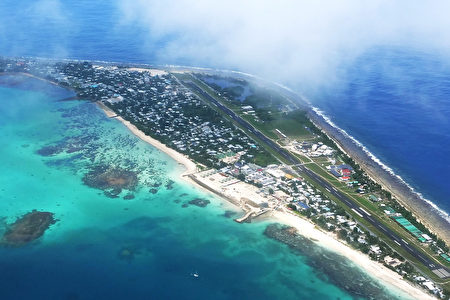
Tuvalu in the midst of a Pacific power struggle with China
As China also pursues small island governments, Australia is set to triple its financial support to Tuvalu, a Pacific Island nation vulnerable to sea level rise, in order to finalize a historic climate migration and security agreement.
Foreign Minister Penny Wong announced on Wednesday night that Australia has allocated A$110 million ($72.27 million) from its national budget to Tuvalu while on a visit to the country.
The amount comprises A$19 million for a land reclamation project to protect Tuvalu’s coastline from rising waters and A$50 million ($32.85 million) for the construction of the first underwater cable that would link the island’s citizens to international telecommunications services.
In addition to the direct financial support of A$10 million, a national security coordination center will cost an additional A$15 million.
Compared to the A$17 million ($11.17 million) Australia gave Tuvalu in 2023–2024, the financing represents a major increase.
China’s aspirations for increased security presence in the Pacific became a political issue in Tuvalu in January when two candidates for the country’s leadership suggested that Tuvalu should rewrite a new security agreement with Australia and explore moving its diplomatic connections from Taiwan to Beijing in order to receive more funding.
Two weeks prior to Tuvalu’s vote, neighboring Nauru severed its ties with Taiwan when China offered to provide more aid and build a port.
The new prime minister of Tuvalu, Feleti Teo, promised to uphold Taiwanese sovereignty and to approve the November agreement to create the Falepili Union with Australia. The treaty acknowledges Tuvalu’s continued existence in spite of rising sea levels and permits its inhabitants to relocate to Australia for employment or study.
In a speech on Wednesday night, Wong stated, “Australia has provided a security guarantee to support Tuvalu in a humanitarian disaster, a pandemic, or the event of attack.”
“It is also the first time in history that two nations have agreed in a legally binding instrument that statehood endures in the face of sea level rise,” she stated.
Through the treaty, Australia is able to scrutinize Tuvalu’s agreements with third parties in a wide range of security domains, including ports and telecommunications.
An advance draft of a joint statement seen by Reuters indicates that Wong and Teo are scheduled to state on Thursday that Tuvalu’s capacity to enter into diplomatic relations with other countries is unaffected by the security cooperation.
“We recognize that the people of Tuvalu deserve the choice to live, study and work elsewhere, as climate change impacts intensify at home,” the statement’s headline states.
All Categories
Tags
+13162306000
zoneyetu@yahoo.com


